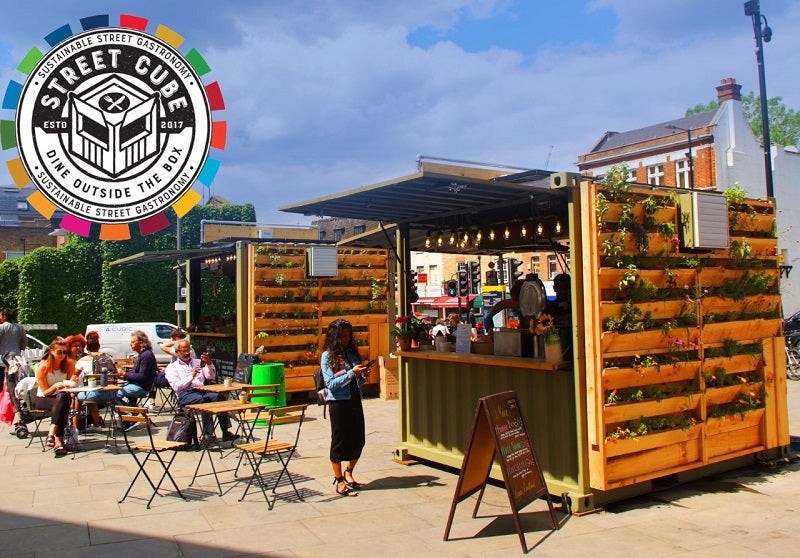
With the current climate emergency the world faces, businesses in the foodservice industry are making pledges and commitments across the sector to stop the pollution of the planet and tackle the climate emergency. Verdict Foodservice spoke to Pascal Gerrard, the founder of StreetCube, about the future of food and how eco-friendly food will benefit the planet.
In a wide ranging interview, Gerrard discussed where the idea for a sustainable street gastronomy semi-permanent street kitchen came from, and how he hopes StreetCube will be the ‘beacon of light for the future of food.’
Rosie Lintott: Where did the idea for your business come from?
PG: The idea for StreetCube has been a long, slow-burning desire to cook better food, that doesn’t cost a fortune.
But the real idea that drove me to want to develop a better food system, came when my daughter Eloise was born – she was born with coeliac disease, and I needed to know why our children were developing so many food allergies. For me, it was a no-brainer that with so many of us becoming obese, with diabetes, with food related health conditions – which our food system was in a bit of mess.
Add to that, the number of fast-food behemoths who dominate our city centres. Then add to that, the changing climate and we have a real food emergency, good food doesn’t have to cost the earth was a phrase I found myself telling everyone.
Good food isn’t just for the wealthy and it should not be causing damage to our planet. Boscombe being the most deprived town in the West, it was essential that we tried to offer the population an alternative to the fried chicken, burgers and kebabs that littered the high street. And we should not be allowing our cities to be run by corporate giants whose only focus is profit and growth. We needed to come together to solve a massive problem. I want StreetCube to be the beacon of light – for the future of food.
RL: What about eco-friendly food got your interest?
PG: We like to refer to StreetCube food as ‘sustainable street gastronomy’; it’s not pompous, it’s just accurate. Gastronomy meaning food which is gathered locally and enjoyed with close friends and family – it is listed and recognised as UNESCO intangible cultural heritage of humanity – and we want to take the essence of what gastronomy really means – and develop it to being something that should be affordable and accessible to everyone.
For us to develop Streetcube as being 100% sustainable, eco-friendly and healthier for people and planet is a no-brainer, because if we don’t stop putting CO2 into the atmosphere right now – it will be too late. Public health, planetary health and sustainability are intrinsically linked. Food is at the centre of this equation.
RL: Do you think businesses are aware of the advantages of eco-friendly food?
PG: Some businesses are becoming more aware of eco-friendly of course, but we are, and will always, be focused on the money – as long as our global system has a monetary system that drives it. I can’t see that ever changing unless we have robots to do everything we need.
There has to be a balance between being sustainable and being financially sustainable but, at this moment, capitalism has been allowed to reign free and the industrial machine has taken us to the brink. It’s time that governments especially put the brakes on, and started taking control and penalising industries that pollute, and rewarding organisations that regenerate.
RL: Is there enough information given to consumers about eco-friendly food?
PG: At the moment, people have no idea that when they shop at a supermarket – where the food comes from, or why it’s better to buy locally grown organic, seasonal ingredients. People don’t realise that 80% of our food is flown in from half way around the globe, adding CO2, contributing to our massive food waste problem – food which is grown using chemical pesticides and antibiotics and other industrial methods.
There is nothing wrong with buying from local growers and producers. When we pick food and harvest vegetables, the food immediately starts to degrade and lose vitamins and minerals, so eating local ensures that food has retained more nutrients. It also means that when we eat through the seasons, we allow the food to ripen naturally, taking in as many nutrients as possible before it is picked.
RL: How big of an issue is eco-friendly food in this current climate?
PG: Eco-friendly food is gathering momentum – but still the UK is less than 2% organic at this point in time. People say, ‘well organic food is more expensive’ which is true but, it’s actually the case that non-organic food is artificially cheap – but the real costs of industrial food are the clean-up and the cost to our NHS. We must all be choosing organic, local and seasonal food.
RL: If businesses switched to eco-friendly food do you think this would help the climate crisis?
PG: Without a doubt, the knock-on effect of everyone eating organic, sustainable, eco-friendly food are enormous. Zero plastic packaging [for example], as food is local, we don’t need to wrap it in plastic. If food is organic, we don’t need pesticides and harmful chemical; we don’t need genetically modified foods, as if we care for and look after the soil properly, food will grow naturally as it has done for millions for years.


